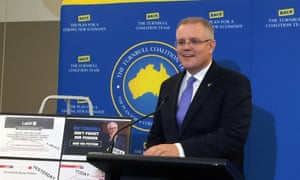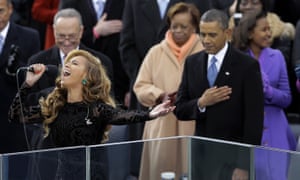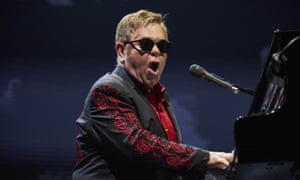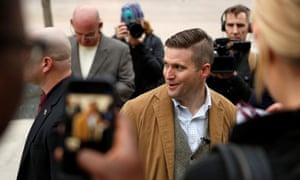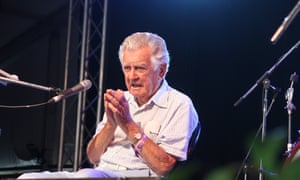Extract from The Guardian
If Donald Trump tries to remove Obama’s new sanctions, he could face
GOP blowback. If he doesn’t, he could damage his relationship with Putin
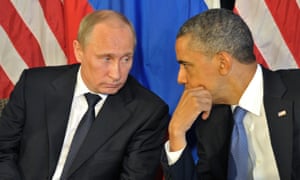

But this is no ordinary transition. President-elect Donald Trump is
urging Americans “to get on with our lives” rather than act on the
intelligence community’s consensus that Russia hacked the Democratic
National Committee with the intent of swaying the election in his favor.
Obama therefore sees this as the last chance to hold Russia accountable and to limit Trump’s options for rapprochement with Vladimir Putin after 20 January.
On Friday morning, Putin announced he would not be expelling US intelligence officers in response, a clear sign of his optimism about the imminent Trump administration. However, Obama has suggested that additional covert actions may be taken against Russia in the near future. A true reciprocal response would involve the release of hacked information about top Russian officials. Russia is a highly centralized kleptocracy, and no one in power has clean hands. The Russian president himself remains stubbornly popular despite his own widely assumed corruption. But any official below him is vulnerable to exposure and disgrace, which the US probably has the capacity to inflict at will.
This kind of weaponized transparency has a certain appeal, as the reactions across the political spectrum to the DNC hacks have demonstrated. But there’s also a dangerous potential for escalation, as neither the US nor Russia has clearly defined cyberwar laws. This danger is exacerbated by the maddening fact that an unstable ignoramus is about to assume control of the US national security apparatus, and no one knows how he might use it.
Trump has consistently indicated a desire to improve US-Russian relations, with the encouragement of several advisers and planned cabinet appointees who have close ties to Moscow. This puts him at odds with the longstanding position of the Republican party, which includes hawks such as Senators John McCain and Lindsey Graham, both of whom are now pressing for an investigation into Russia’s role in the election.
The Senate majority leader, Mitch McConnell, and House speaker, Paul Ryan, also support this, although CIA sources told the Washington Post that McConnell blocked any investigation prior to the election, a breathtakingly cynical move that explains why Obama is only now retaliating.
Having compromised national security in order to defeat Hillary Clinton, the Republican leadership may now see Trump as expendable. After all, he chose a standard rightwing Republican, the Indiana governor, Mike Pence, as his running mate, which means McConnell and Ryan can always arrange to have Trump impeached if he becomes too much trouble.
For Obama, Russia is thus a uniquely effective wedge issue, with the potential to divide the president-elect from his party. If Trump tries to remove the new sanctions, he could face blowback from Congress; if he doesn’t, his friendly relationship with Putin could be damaged.
If, if, if. It’s dizzying trying to keep track of the conflicting agendas in Washington as Obama tries to salvage any kind of legacy, Trump scrambles to learn the basics of running the country, the GOP leadership moves to consolidate its Faustian victory, the intelligence community tries to compensate for its calamitous failure to prevent any of this and pundits left and right perpetuate confusion and despair. It’s increasingly unclear who’s in charge.
Meanwhile, in the Kremlin, Putin is as securely in power as ever and must be watching with amusement. Two months ago, it looked like Clinton, a staunch critic of Russia, would take control of the world’s most powerful country and enact more confrontational, and perhaps ill-advised, policies everywhere from Syria to Ukraine. Instead, Trump is poised to turn America into something much closer to Russia, except far more divided. And whatever consequences Obama hopes to inflict on Russia are likely to be brief and minor, in contrast to the substantial damage Putin has already inflicted on the United States.
On Friday morning, Putin announced he would not be expelling US intelligence officers in response, a clear sign of his optimism about the imminent Trump administration. However, Obama has suggested that additional covert actions may be taken against Russia in the near future. A true reciprocal response would involve the release of hacked information about top Russian officials. Russia is a highly centralized kleptocracy, and no one in power has clean hands. The Russian president himself remains stubbornly popular despite his own widely assumed corruption. But any official below him is vulnerable to exposure and disgrace, which the US probably has the capacity to inflict at will.
This kind of weaponized transparency has a certain appeal, as the reactions across the political spectrum to the DNC hacks have demonstrated. But there’s also a dangerous potential for escalation, as neither the US nor Russia has clearly defined cyberwar laws. This danger is exacerbated by the maddening fact that an unstable ignoramus is about to assume control of the US national security apparatus, and no one knows how he might use it.
Trump has consistently indicated a desire to improve US-Russian relations, with the encouragement of several advisers and planned cabinet appointees who have close ties to Moscow. This puts him at odds with the longstanding position of the Republican party, which includes hawks such as Senators John McCain and Lindsey Graham, both of whom are now pressing for an investigation into Russia’s role in the election.
The Senate majority leader, Mitch McConnell, and House speaker, Paul Ryan, also support this, although CIA sources told the Washington Post that McConnell blocked any investigation prior to the election, a breathtakingly cynical move that explains why Obama is only now retaliating.
Having compromised national security in order to defeat Hillary Clinton, the Republican leadership may now see Trump as expendable. After all, he chose a standard rightwing Republican, the Indiana governor, Mike Pence, as his running mate, which means McConnell and Ryan can always arrange to have Trump impeached if he becomes too much trouble.
For Obama, Russia is thus a uniquely effective wedge issue, with the potential to divide the president-elect from his party. If Trump tries to remove the new sanctions, he could face blowback from Congress; if he doesn’t, his friendly relationship with Putin could be damaged.
If, if, if. It’s dizzying trying to keep track of the conflicting agendas in Washington as Obama tries to salvage any kind of legacy, Trump scrambles to learn the basics of running the country, the GOP leadership moves to consolidate its Faustian victory, the intelligence community tries to compensate for its calamitous failure to prevent any of this and pundits left and right perpetuate confusion and despair. It’s increasingly unclear who’s in charge.
Meanwhile, in the Kremlin, Putin is as securely in power as ever and must be watching with amusement. Two months ago, it looked like Clinton, a staunch critic of Russia, would take control of the world’s most powerful country and enact more confrontational, and perhaps ill-advised, policies everywhere from Syria to Ukraine. Instead, Trump is poised to turn America into something much closer to Russia, except far more divided. And whatever consequences Obama hopes to inflict on Russia are likely to be brief and minor, in contrast to the substantial damage Putin has already inflicted on the United States.
